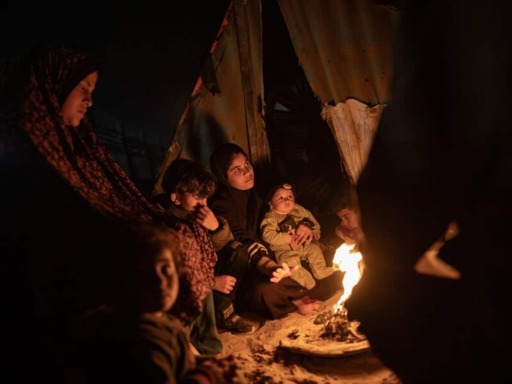The Network of Civil Society Organisations in the Gaza Strip has warned of a rapid deterioration in humanitarian conditions due to the Israeli occupation’s continued refusal to allow the entry of materials needed to rehabilitate the destroyed water networks. In a press statement, civil society organisations in Gaza said that most of the tents used to house displaced persons are no longer usable after months of displacement, noting that the Strip needs around 300,000 new tents before winter arrives.
Gaza urgently needs tents
With winter approaching, fears are mounting among tens of thousands of displaced families who lack tents suitable for shelter or protection from rain and cold. Many live under worn-out plastic sheets, while others rely on patched pieces of cloth that cannot withstand wind and storms. Families, especially children, women and older and disabled people, face the risk of severe cold and disease in the absence of heating, winter clothing and basic protective items.
In this context, the Government Media Office in Gaza reported that the Israeli army committed 194 violations of the ceasefire agreement signed on 10 October.
The director of the office, Ismail al-Thawabta, said that these violations included Israeli forces crossing the demarcation line, preventing the entry of medicines, medical supplies, tents and mobile homes, as well as continuing shelling, shooting and incursions into various areas of the Strip.
Al-Thawabta pointed out that the agreement stipulates the delivery of more than 300,000 tents and mobile housing units to shelter displaced persons, at a time when some 288,000 families are living without stable shelter and are relying on the streets and public squares. He also estimated the extent of damage to Gaza’s civilian infrastructure at around 90%, with initial losses amounting to approximately $70 billion.
Al-Thawabta accused Israel of deliberately exacerbating the humanitarian crisis by preventing more than 6,000 aid trucks from entering through the Rafah crossing, calling on the United States and international mediators to take action to ensure compliance with the terms of the agreement and lift restrictions on aid.
A deliberate humanitarian crisis
Despite the cessation of direct confrontations, the population continues to face severe shortages of food, water and medicine, amid ongoing displacement and rising hunger rates. Palestinian data indicate that the conflict that erupted on 7 October 2023 has resulted in more than 238,000 deaths and injuries, in addition to thousands of missing persons and widespread destruction of infrastructure.
Palestinian and international bodies have accused Israel of committing grave violations during the war, while Israel says its operations targeted armed factions in the Strip.
As appeals for urgent shelter supplies continue, displaced people in Gaza are preparing for a harsh winter with empty hands and hearts heavy with fear, waiting for a tent that will give them a minimum of security and the simple human right to survive.
Featured image via the Canary
By Alaa Shamali
From Canary via this RSS feed


